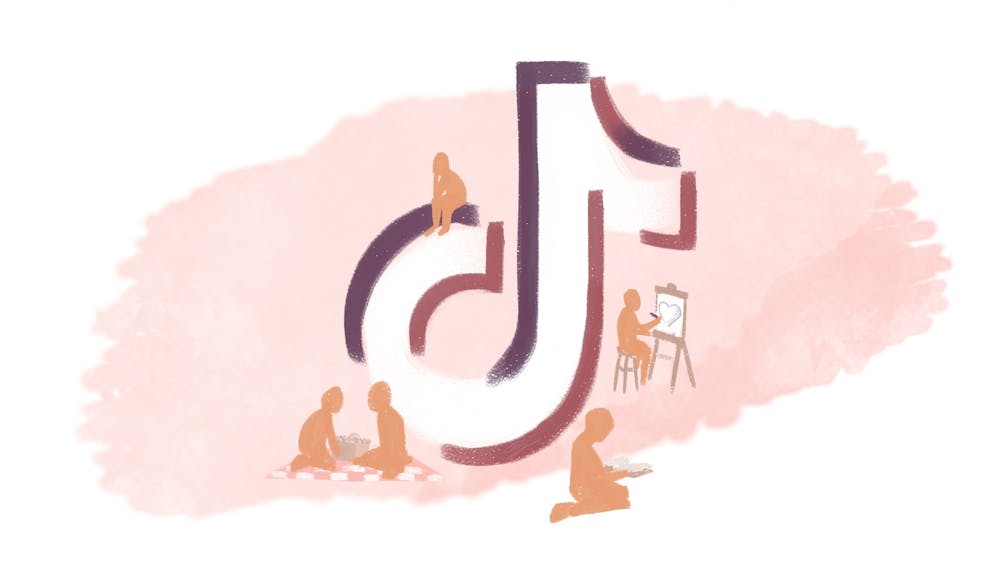Since its launch in 2016, TikTok has latched onto the lives of a wide variety of users worldwide, from professionals to influencers, meaning that nearly every aspect of popular culture is reflected in the app.
Naturally, TikTok’s take on love is both influential and reflective. The recent “Have you ever been in love?” trend on the app has gone viral, with its impact skyrocketing across countries. This trend is from the hit British teen TV show Skins, a comedy–drama about a group of high school teenagers. The trend features a conversation between two characters, Cassie and Jay, in which they ask: "Have you ever been in love?" "I don't think so." "Do you want me to describe it to you?" In the TikTok trend itself, users present their own take on love by putting a slideshow of images depicting what love looks like for them.
At first, the trend started out as a way for couples to express their relationship in an online space. Joanne Molinaro (@thekoreanvegan), for instance, shows photos of her and her husband throughout their relationship to commemorate their anniversary.
The trend is a heartwarming way for couples to portray their love for one another—and, in the case of Molinaro, include voiceover commentary on the complexities of love that are often neglected—but in many cases, it's is a too–easy way for viewers to romanticize the curated slideshow images of love that TikTok displays to its users. Unlike what's often shown on social media, life doesn’t have a rose–colored tint, nor is it perfect—life is messy, chaotic, and not always pleasant or easy. And the same goes for love and relationships.
By predominantly focusing on romantic love, the trend also highlights the social media clout associated with relationships. Instagram and TikTok particularly dominate American pop culture, commodifying and glorifying relationships through likes and comment features, which is why many couples may feel pressured to have a big social media presence. Posting on social media often causes stress for couples by creating unrealistic expectations and making them feel as though their partner is only interested in their public presence. While it’s easy to smile for the camera and post a picture with your significant other, it’s much harder to build a fulfilling relationship built on mutual trust and happiness. Genuine love doesn’t always need to be shown off to the world through social media. In fact, studies have found that couples who rarely post on social media are often happier.
But as the viral TikTok trend evolved, users took a perspective on love that reflects more of its challenges. Some users have described the messier aspects of romantic love by asking questions like, “Have you ever been with [someone] who doesn’t know how to love?”, or exploring “What it feels like to love someone when you’re depressed.” The vulnerability of users worldwide is both raw and unifying, an unapologetic look at love and heartache.
Meanwhile, other users have featured aspects of romance that are more common than we assume by including questions like, “Have you ever been in a situationship?”, “Have you ever been in an on–and–off relationship?”, or “Have you ever been in love with someone long distance?” These questions all cover life phases many teenagers or adults have faced and relate to, regardless of their relationship status. Some have attempted to depict more simple and honest portrayals of romantic love with slideshows of their lovers napping, crying, shaving, studying, and participating in other everyday activities. Others have discussed their experiences in relationships from previous heartbreaks to current moments of happiness.
The trend has also grown to focus on different types of love—platonic, familial, communal, and more. The @bomdia.bowls TikTok account describesplatonic love by writing, “Have you ever had [best friends] at work?” and showing pictures of coworkers dancing at the açaí bowl shop they work at. Another user, @leslienicolex, jokes about familial love by asking, “Have you ever shared a room with siblings?” and ending the clip with the caption “I’m gonna hum a song, try and guess what song it is” to evoke the mundane, yet nostalgic sibling interactions that many users may remember from their own childhoods. TikToks like these show that love can take on several forms, and each type has its own place in our hearts.
TikTok can undoubtedly be a platform that encourages unrealistic presentations of fabricated happiness, but it can also unite users worldwide over shared experiences and emotions. On a day like Valentine’s Day—but also every other—we can be brought together under a shared dedication to loving the people that make our relationships worthwhile.







